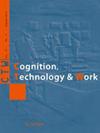主要心血管危险因素在退休和心血管疾病相关性中的调节作用:来自SHARE葡萄牙的结果
IF 3.4
3区 工程技术
Q2 ENGINEERING, INDUSTRIAL
引用次数: 0
摘要
尽管有实际的人口趋势和心血管疾病的全球负担,但关于退休对这一健康结果的影响知之甚少。目的:我们旨在量化葡萄牙人口中退休和退休年龄与心血管疾病(心脏病和中风)之间的关系。方法:我们使用了欧洲健康老龄化和退休调查的第一波葡萄牙数据。应用逻辑回归对相关性进行量化。心血管疾病的主要危险因素和退休的几个特征被认为是可能的混杂因素或影响调节因素。分析仅限于退休过程中的退休人员(退休时间不超过5年)和非因病退休人员。结果在不同的高血压状态下,退休与心脏病的关系呈相反方向,但不显著。仅在没有心脏病的人群中,提前退休增加了患中风的几率(OR = 8.87;95% ci 1.63-48.26)。相反,在患有心脏病的个体中,降低了患中风的几率(OR = 0.08;95% ci 0.01-0.68)。结论研究结果表明,在心脏病和中风的主要危险因素存在或不存在的情况下,退休和退休年龄可能分别是有益的或有害的。我们认为,工作压力对有或没有这些风险因素的不同员工的影响可能最终解释了这些发现。本文章由计算机程序翻译,如有差异,请以英文原文为准。
The modifying role of major cardiovascular risk factors in the association between retirement and cardiovascular disease: Results from SHARE Portugal.
BACKGROUND
Despite the actual demographic trends and the global burden of cardiovascular diseases, there is little knowledge concerning the effects of retirement on this health outcome.
OBJECTIVE
We aimed to quantify the associations between retirement, and retirement age, with cardiovascular disease (heart disease and stroke) in the Portuguese population.
METHODS
We used data from the first Portuguese wave of the Survey of Health Ageing and Retirement in Europe. Logistic regression was applied to quantify the associations. The major risk factors for cardiovascular diseases and several features of retirement were considered as possible confounders or effect modifiers. Analysis was restricted to retirees in retirement process (retired for 5 years or less) and not retired because of illness.
RESULTS
An opposite direction of the association between retirement and heart disease was observed according to hypertension status, although not significant. Early retirement increased the odds of having a stroke, merely in individuals without heart disease (OR = 8.87; 95% CI 1.63-48.26). On the contrary, in individuals with heart disease, decreased the odds of having a stroke in (OR = 0.08; 95% CI 0.01-0.68).
CONCLUSIONS
Our findings suggest that retirement and retirement age may be beneficial or harmful, respectively, in the presence or absence of major risk factors for heart disease and stroke. We suggest that work-related stress affecting differently workers with and without these risk factors may eventually explain these findings.
求助全文
通过发布文献求助,成功后即可免费获取论文全文。
去求助
来源期刊

Cognition Technology & Work
ENGINEERING, INDUSTRIAL-
CiteScore
6.90
自引率
7.70%
发文量
26
审稿时长
>12 weeks
期刊介绍:
Cognition, Technology & Work focuses on the practical issues of human interaction with technology within the context of work and, in particular, how human cognition affects, and is affected by, work and working conditions.
The aim is to publish research that normally resides on the borderline between people, technology, and organisations. Including how people use information technology, how experience and expertise develop through work, and how incidents and accidents are due to the interaction between individual, technical and organisational factors.
The target is thus the study of people at work from a cognitive systems engineering and socio-technical systems perspective.
The most relevant working contexts of interest to CTW are those where the impact of modern technologies on people at work is particularly important for the users involved as well as for the effects on the environment and plants. Modern society has come to depend on the safe and efficient functioning of a multitude of technological systems as diverse as industrial production, transportation, communication, supply of energy, information and materials, health and finance.
 求助内容:
求助内容: 应助结果提醒方式:
应助结果提醒方式:


